CPPREP4003: Access and Interpret Legislation in Real Estate
VerifiedAdded on 2022/12/05
|15
|5085
|308
Report
AI Summary
This report provides a comprehensive overview of key legislation governing the real estate industry in New South Wales, Australia, focusing on the CPPREP4003 unit of competency. It examines the Property, Stock and Business Agent Act 2002 and its 2019 Regulation, detailing licensing, disclosure obligations, rules of conduct, and disciplinary actions. The report also analyzes the Residential Tenancies Act 2010 and its 2019 Regulation, outlining provisions related to tenancy agreements, tenant security, dispute resolution, and property manager responsibilities. Furthermore, it explores the rules of conduct for real estate professionals, emphasizing ethical practices, disciplinary grounds, and the role of the Secretary in enforcing regulations. Case studies are included to illustrate the application of the legislation. The report aims to provide a clear understanding of the legal framework and ethical standards within the real estate sector, providing a valuable resource for students and professionals alike. The report covers the main purpose, major changes, and penalties related to the acts and regulations.
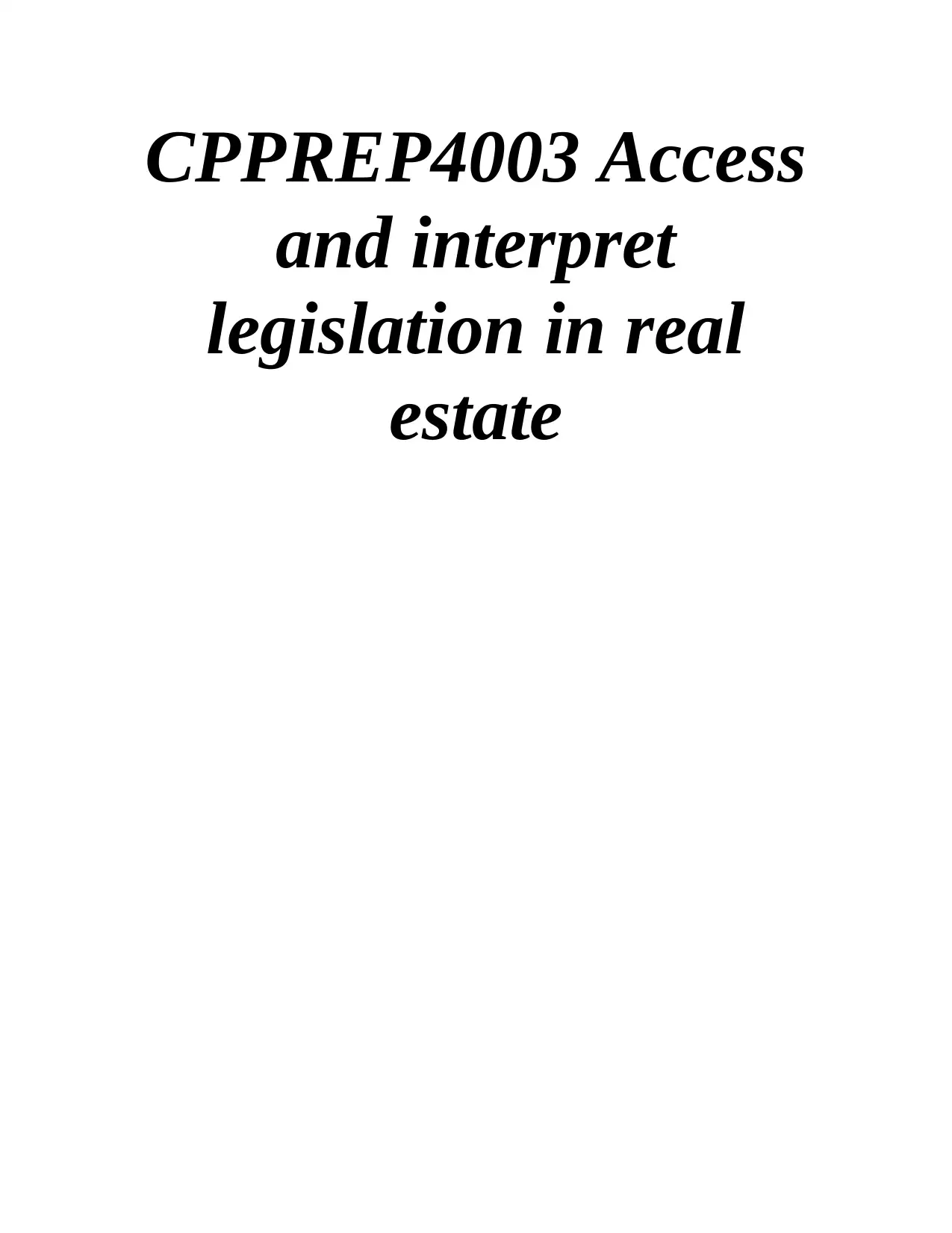
CPPREP4003 Access
and interpret
legislation in real
estate
and interpret
legislation in real
estate
Paraphrase This Document
Need a fresh take? Get an instant paraphrase of this document with our AI Paraphraser
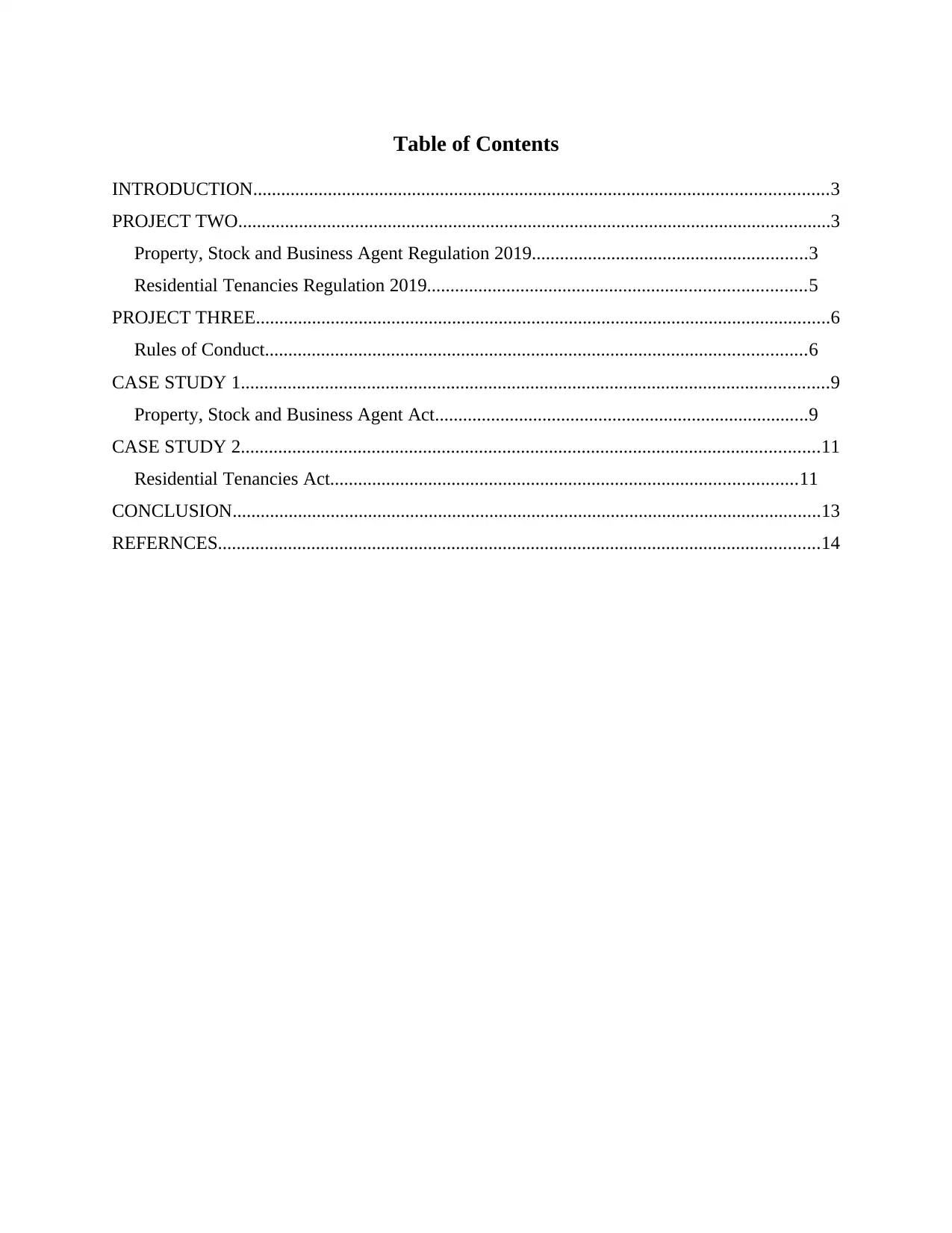
Table of Contents
INTRODUCTION...........................................................................................................................3
PROJECT TWO...............................................................................................................................3
Property, Stock and Business Agent Regulation 2019...........................................................3
Residential Tenancies Regulation 2019.................................................................................5
PROJECT THREE...........................................................................................................................6
Rules of Conduct....................................................................................................................6
CASE STUDY 1..............................................................................................................................9
Property, Stock and Business Agent Act................................................................................9
CASE STUDY 2............................................................................................................................11
Residential Tenancies Act....................................................................................................11
CONCLUSION..............................................................................................................................13
REFERNCES.................................................................................................................................14
INTRODUCTION...........................................................................................................................3
PROJECT TWO...............................................................................................................................3
Property, Stock and Business Agent Regulation 2019...........................................................3
Residential Tenancies Regulation 2019.................................................................................5
PROJECT THREE...........................................................................................................................6
Rules of Conduct....................................................................................................................6
CASE STUDY 1..............................................................................................................................9
Property, Stock and Business Agent Act................................................................................9
CASE STUDY 2............................................................................................................................11
Residential Tenancies Act....................................................................................................11
CONCLUSION..............................................................................................................................13
REFERNCES.................................................................................................................................14
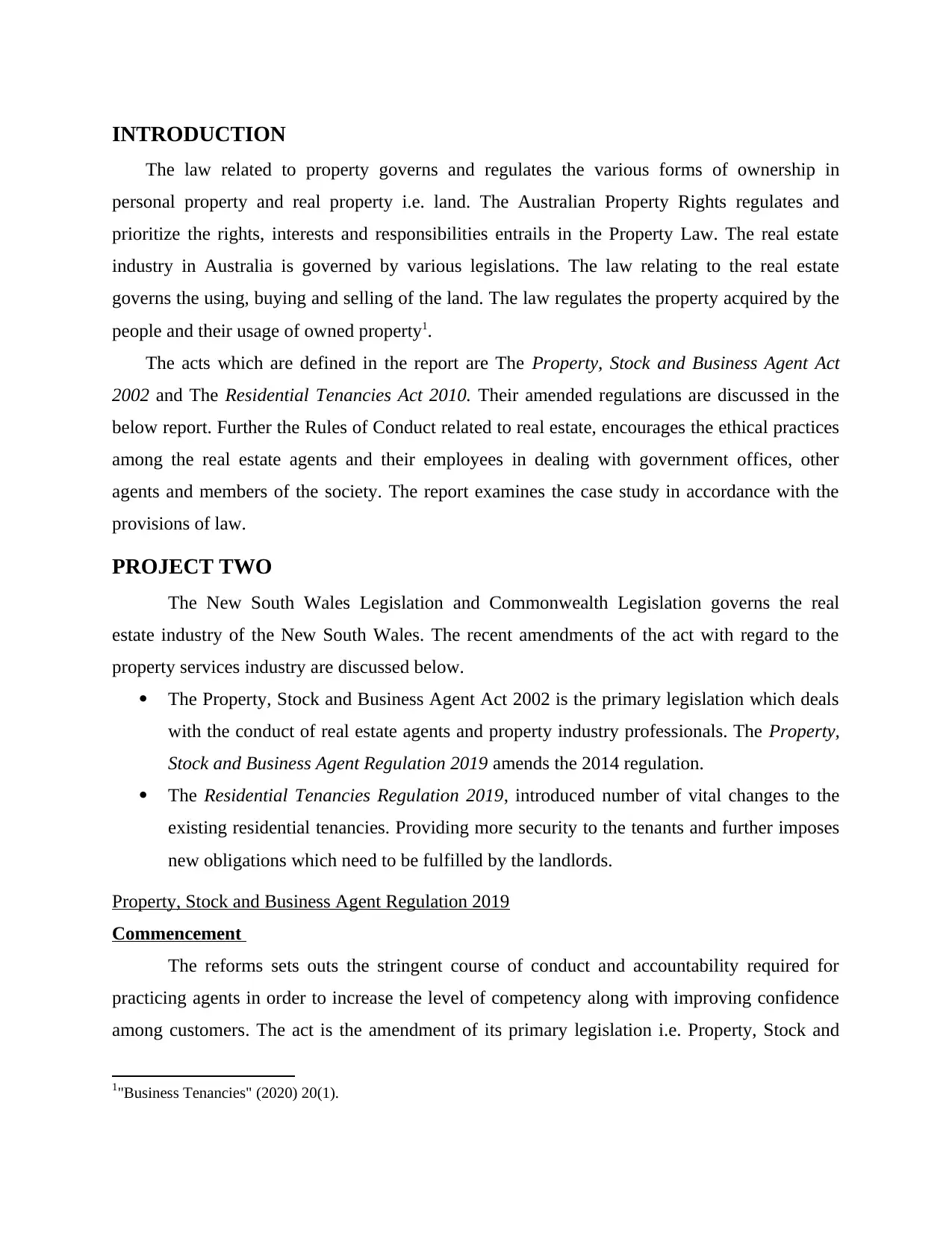
INTRODUCTION
The law related to property governs and regulates the various forms of ownership in
personal property and real property i.e. land. The Australian Property Rights regulates and
prioritize the rights, interests and responsibilities entrails in the Property Law. The real estate
industry in Australia is governed by various legislations. The law relating to the real estate
governs the using, buying and selling of the land. The law regulates the property acquired by the
people and their usage of owned property1.
The acts which are defined in the report are The Property, Stock and Business Agent Act
2002 and The Residential Tenancies Act 2010. Their amended regulations are discussed in the
below report. Further the Rules of Conduct related to real estate, encourages the ethical practices
among the real estate agents and their employees in dealing with government offices, other
agents and members of the society. The report examines the case study in accordance with the
provisions of law.
PROJECT TWO
The New South Wales Legislation and Commonwealth Legislation governs the real
estate industry of the New South Wales. The recent amendments of the act with regard to the
property services industry are discussed below.
The Property, Stock and Business Agent Act 2002 is the primary legislation which deals
with the conduct of real estate agents and property industry professionals. The Property,
Stock and Business Agent Regulation 2019 amends the 2014 regulation.
The Residential Tenancies Regulation 2019, introduced number of vital changes to the
existing residential tenancies. Providing more security to the tenants and further imposes
new obligations which need to be fulfilled by the landlords.
Property, Stock and Business Agent Regulation 2019
Commencement
The reforms sets outs the stringent course of conduct and accountability required for
practicing agents in order to increase the level of competency along with improving confidence
among customers. The act is the amendment of its primary legislation i.e. Property, Stock and
1"Business Tenancies" (2020) 20(1).
The law related to property governs and regulates the various forms of ownership in
personal property and real property i.e. land. The Australian Property Rights regulates and
prioritize the rights, interests and responsibilities entrails in the Property Law. The real estate
industry in Australia is governed by various legislations. The law relating to the real estate
governs the using, buying and selling of the land. The law regulates the property acquired by the
people and their usage of owned property1.
The acts which are defined in the report are The Property, Stock and Business Agent Act
2002 and The Residential Tenancies Act 2010. Their amended regulations are discussed in the
below report. Further the Rules of Conduct related to real estate, encourages the ethical practices
among the real estate agents and their employees in dealing with government offices, other
agents and members of the society. The report examines the case study in accordance with the
provisions of law.
PROJECT TWO
The New South Wales Legislation and Commonwealth Legislation governs the real
estate industry of the New South Wales. The recent amendments of the act with regard to the
property services industry are discussed below.
The Property, Stock and Business Agent Act 2002 is the primary legislation which deals
with the conduct of real estate agents and property industry professionals. The Property,
Stock and Business Agent Regulation 2019 amends the 2014 regulation.
The Residential Tenancies Regulation 2019, introduced number of vital changes to the
existing residential tenancies. Providing more security to the tenants and further imposes
new obligations which need to be fulfilled by the landlords.
Property, Stock and Business Agent Regulation 2019
Commencement
The reforms sets outs the stringent course of conduct and accountability required for
practicing agents in order to increase the level of competency along with improving confidence
among customers. The act is the amendment of its primary legislation i.e. Property, Stock and
1"Business Tenancies" (2020) 20(1).
⊘ This is a preview!⊘
Do you want full access?
Subscribe today to unlock all pages.

Trusted by 1+ million students worldwide
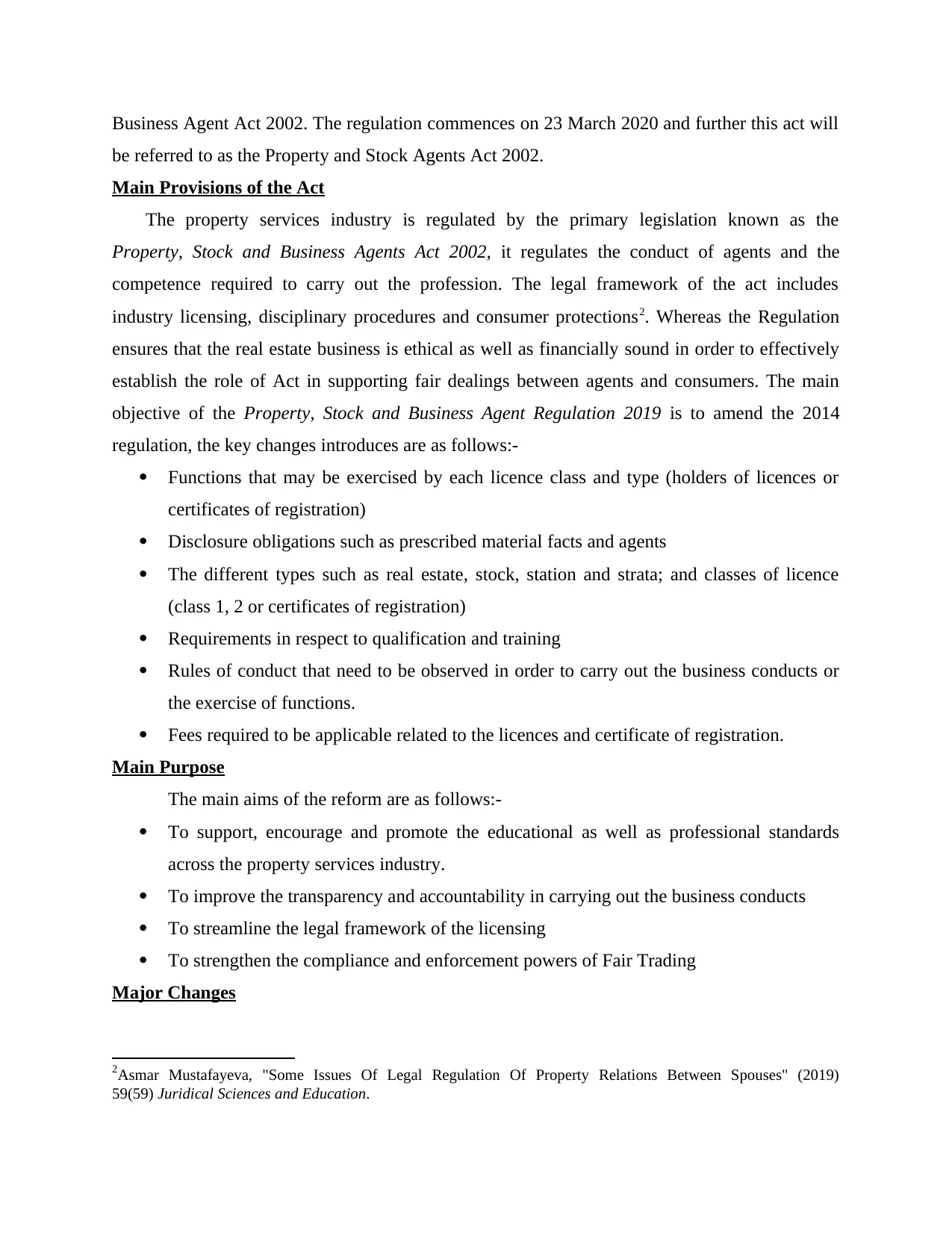
Business Agent Act 2002. The regulation commences on 23 March 2020 and further this act will
be referred to as the Property and Stock Agents Act 2002.
Main Provisions of the Act
The property services industry is regulated by the primary legislation known as the
Property, Stock and Business Agents Act 2002, it regulates the conduct of agents and the
competence required to carry out the profession. The legal framework of the act includes
industry licensing, disciplinary procedures and consumer protections2. Whereas the Regulation
ensures that the real estate business is ethical as well as financially sound in order to effectively
establish the role of Act in supporting fair dealings between agents and consumers. The main
objective of the Property, Stock and Business Agent Regulation 2019 is to amend the 2014
regulation, the key changes introduces are as follows:-
Functions that may be exercised by each licence class and type (holders of licences or
certificates of registration)
Disclosure obligations such as prescribed material facts and agents
The different types such as real estate, stock, station and strata; and classes of licence
(class 1, 2 or certificates of registration)
Requirements in respect to qualification and training
Rules of conduct that need to be observed in order to carry out the business conducts or
the exercise of functions.
Fees required to be applicable related to the licences and certificate of registration.
Main Purpose
The main aims of the reform are as follows:-
To support, encourage and promote the educational as well as professional standards
across the property services industry.
To improve the transparency and accountability in carrying out the business conducts
To streamline the legal framework of the licensing
To strengthen the compliance and enforcement powers of Fair Trading
Major Changes
2Asmar Mustafayeva, "Some Issues Of Legal Regulation Of Property Relations Between Spouses" (2019)
59(59) Juridical Sciences and Education.
be referred to as the Property and Stock Agents Act 2002.
Main Provisions of the Act
The property services industry is regulated by the primary legislation known as the
Property, Stock and Business Agents Act 2002, it regulates the conduct of agents and the
competence required to carry out the profession. The legal framework of the act includes
industry licensing, disciplinary procedures and consumer protections2. Whereas the Regulation
ensures that the real estate business is ethical as well as financially sound in order to effectively
establish the role of Act in supporting fair dealings between agents and consumers. The main
objective of the Property, Stock and Business Agent Regulation 2019 is to amend the 2014
regulation, the key changes introduces are as follows:-
Functions that may be exercised by each licence class and type (holders of licences or
certificates of registration)
Disclosure obligations such as prescribed material facts and agents
The different types such as real estate, stock, station and strata; and classes of licence
(class 1, 2 or certificates of registration)
Requirements in respect to qualification and training
Rules of conduct that need to be observed in order to carry out the business conducts or
the exercise of functions.
Fees required to be applicable related to the licences and certificate of registration.
Main Purpose
The main aims of the reform are as follows:-
To support, encourage and promote the educational as well as professional standards
across the property services industry.
To improve the transparency and accountability in carrying out the business conducts
To streamline the legal framework of the licensing
To strengthen the compliance and enforcement powers of Fair Trading
Major Changes
2Asmar Mustafayeva, "Some Issues Of Legal Regulation Of Property Relations Between Spouses" (2019)
59(59) Juridical Sciences and Education.
Paraphrase This Document
Need a fresh take? Get an instant paraphrase of this document with our AI Paraphraser
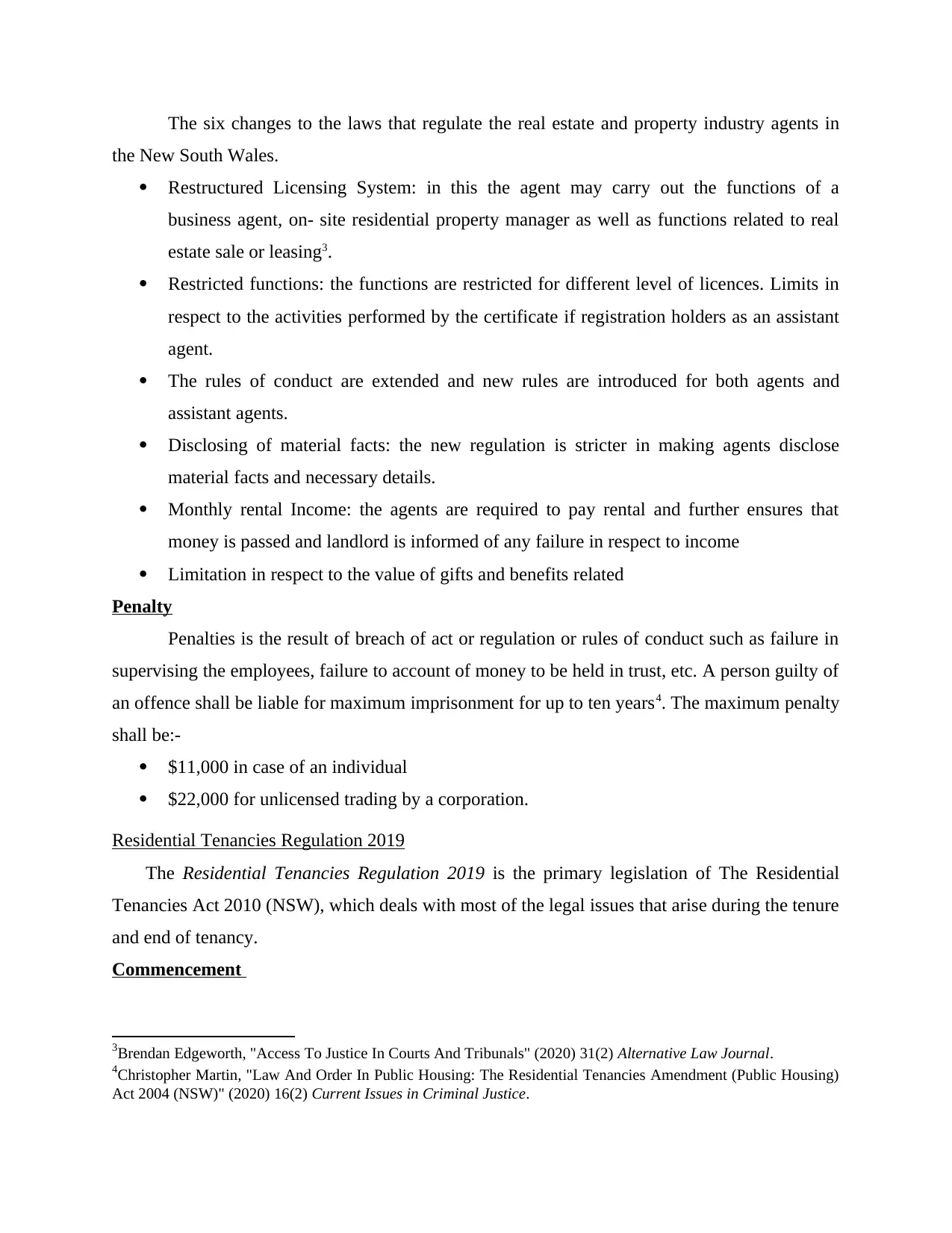
The six changes to the laws that regulate the real estate and property industry agents in
the New South Wales.
Restructured Licensing System: in this the agent may carry out the functions of a
business agent, on- site residential property manager as well as functions related to real
estate sale or leasing3.
Restricted functions: the functions are restricted for different level of licences. Limits in
respect to the activities performed by the certificate if registration holders as an assistant
agent.
The rules of conduct are extended and new rules are introduced for both agents and
assistant agents.
Disclosing of material facts: the new regulation is stricter in making agents disclose
material facts and necessary details.
Monthly rental Income: the agents are required to pay rental and further ensures that
money is passed and landlord is informed of any failure in respect to income
Limitation in respect to the value of gifts and benefits related
Penalty
Penalties is the result of breach of act or regulation or rules of conduct such as failure in
supervising the employees, failure to account of money to be held in trust, etc. A person guilty of
an offence shall be liable for maximum imprisonment for up to ten years4. The maximum penalty
shall be:-
$11,000 in case of an individual
$22,000 for unlicensed trading by a corporation.
Residential Tenancies Regulation 2019
The Residential Tenancies Regulation 2019 is the primary legislation of The Residential
Tenancies Act 2010 (NSW), which deals with most of the legal issues that arise during the tenure
and end of tenancy.
Commencement
3Brendan Edgeworth, "Access To Justice In Courts And Tribunals" (2020) 31(2) Alternative Law Journal.
4Christopher Martin, "Law And Order In Public Housing: The Residential Tenancies Amendment (Public Housing)
Act 2004 (NSW)" (2020) 16(2) Current Issues in Criminal Justice.
the New South Wales.
Restructured Licensing System: in this the agent may carry out the functions of a
business agent, on- site residential property manager as well as functions related to real
estate sale or leasing3.
Restricted functions: the functions are restricted for different level of licences. Limits in
respect to the activities performed by the certificate if registration holders as an assistant
agent.
The rules of conduct are extended and new rules are introduced for both agents and
assistant agents.
Disclosing of material facts: the new regulation is stricter in making agents disclose
material facts and necessary details.
Monthly rental Income: the agents are required to pay rental and further ensures that
money is passed and landlord is informed of any failure in respect to income
Limitation in respect to the value of gifts and benefits related
Penalty
Penalties is the result of breach of act or regulation or rules of conduct such as failure in
supervising the employees, failure to account of money to be held in trust, etc. A person guilty of
an offence shall be liable for maximum imprisonment for up to ten years4. The maximum penalty
shall be:-
$11,000 in case of an individual
$22,000 for unlicensed trading by a corporation.
Residential Tenancies Regulation 2019
The Residential Tenancies Regulation 2019 is the primary legislation of The Residential
Tenancies Act 2010 (NSW), which deals with most of the legal issues that arise during the tenure
and end of tenancy.
Commencement
3Brendan Edgeworth, "Access To Justice In Courts And Tribunals" (2020) 31(2) Alternative Law Journal.
4Christopher Martin, "Law And Order In Public Housing: The Residential Tenancies Amendment (Public Housing)
Act 2004 (NSW)" (2020) 16(2) Current Issues in Criminal Justice.
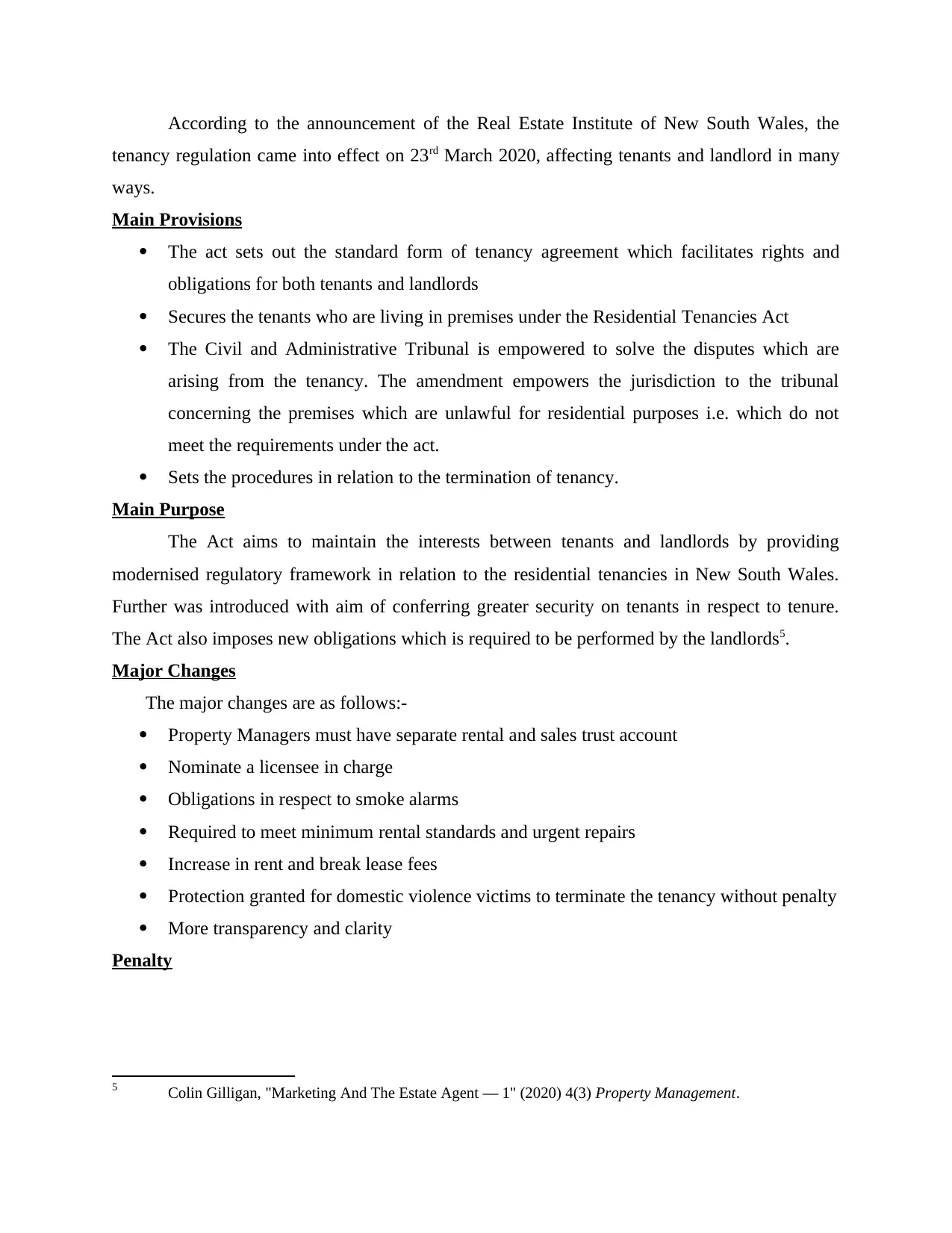
According to the announcement of the Real Estate Institute of New South Wales, the
tenancy regulation came into effect on 23rd March 2020, affecting tenants and landlord in many
ways.
Main Provisions
The act sets out the standard form of tenancy agreement which facilitates rights and
obligations for both tenants and landlords
Secures the tenants who are living in premises under the Residential Tenancies Act
The Civil and Administrative Tribunal is empowered to solve the disputes which are
arising from the tenancy. The amendment empowers the jurisdiction to the tribunal
concerning the premises which are unlawful for residential purposes i.e. which do not
meet the requirements under the act.
Sets the procedures in relation to the termination of tenancy.
Main Purpose
The Act aims to maintain the interests between tenants and landlords by providing
modernised regulatory framework in relation to the residential tenancies in New South Wales.
Further was introduced with aim of conferring greater security on tenants in respect to tenure.
The Act also imposes new obligations which is required to be performed by the landlords5.
Major Changes
The major changes are as follows:-
Property Managers must have separate rental and sales trust account
Nominate a licensee in charge
Obligations in respect to smoke alarms
Required to meet minimum rental standards and urgent repairs
Increase in rent and break lease fees
Protection granted for domestic violence victims to terminate the tenancy without penalty
More transparency and clarity
Penalty
5 Colin Gilligan, "Marketing And The Estate Agent — 1" (2020) 4(3) Property Management.
tenancy regulation came into effect on 23rd March 2020, affecting tenants and landlord in many
ways.
Main Provisions
The act sets out the standard form of tenancy agreement which facilitates rights and
obligations for both tenants and landlords
Secures the tenants who are living in premises under the Residential Tenancies Act
The Civil and Administrative Tribunal is empowered to solve the disputes which are
arising from the tenancy. The amendment empowers the jurisdiction to the tribunal
concerning the premises which are unlawful for residential purposes i.e. which do not
meet the requirements under the act.
Sets the procedures in relation to the termination of tenancy.
Main Purpose
The Act aims to maintain the interests between tenants and landlords by providing
modernised regulatory framework in relation to the residential tenancies in New South Wales.
Further was introduced with aim of conferring greater security on tenants in respect to tenure.
The Act also imposes new obligations which is required to be performed by the landlords5.
Major Changes
The major changes are as follows:-
Property Managers must have separate rental and sales trust account
Nominate a licensee in charge
Obligations in respect to smoke alarms
Required to meet minimum rental standards and urgent repairs
Increase in rent and break lease fees
Protection granted for domestic violence victims to terminate the tenancy without penalty
More transparency and clarity
Penalty
5 Colin Gilligan, "Marketing And The Estate Agent — 1" (2020) 4(3) Property Management.
⊘ This is a preview!⊘
Do you want full access?
Subscribe today to unlock all pages.

Trusted by 1+ million students worldwide
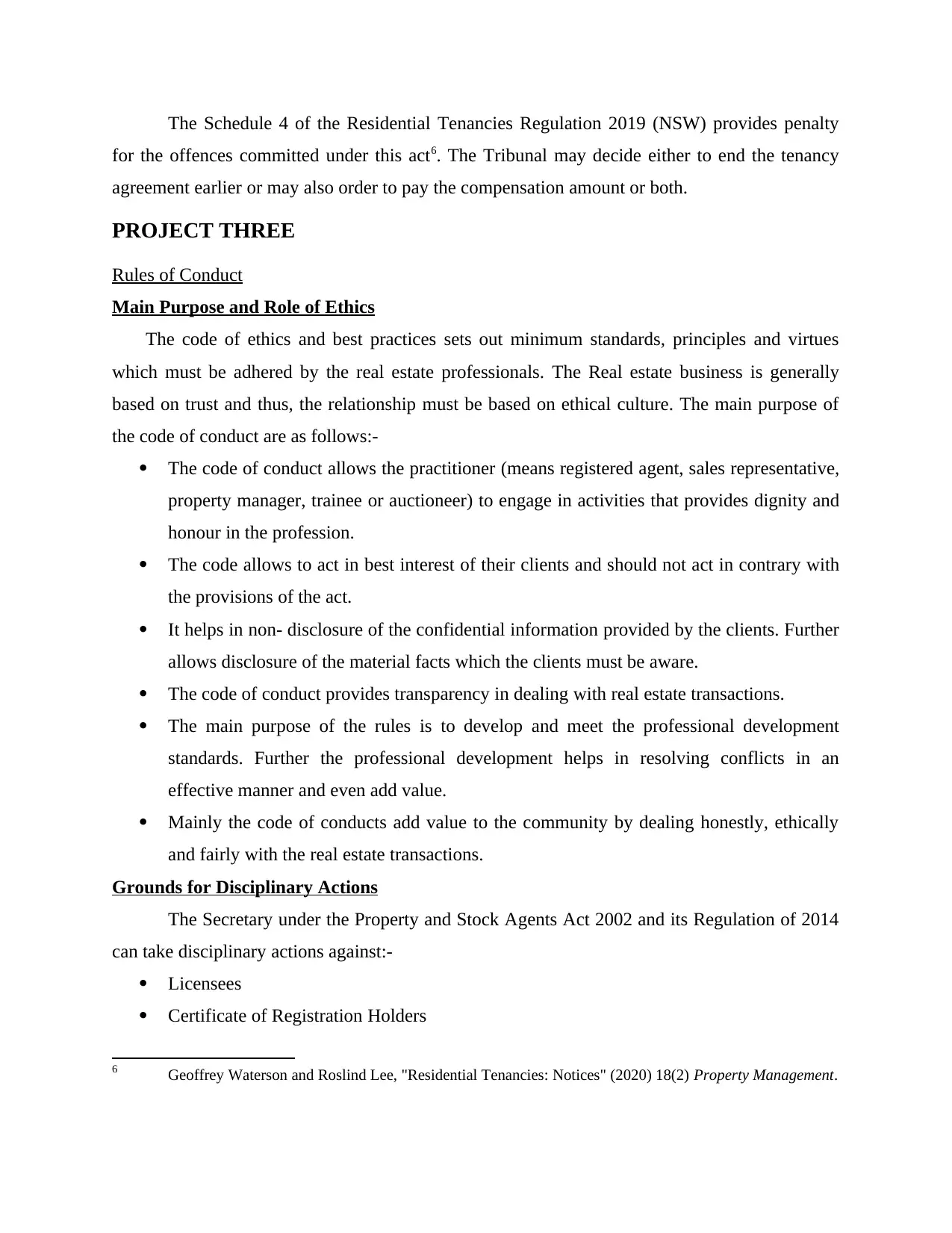
The Schedule 4 of the Residential Tenancies Regulation 2019 (NSW) provides penalty
for the offences committed under this act6. The Tribunal may decide either to end the tenancy
agreement earlier or may also order to pay the compensation amount or both.
PROJECT THREE
Rules of Conduct
Main Purpose and Role of Ethics
The code of ethics and best practices sets out minimum standards, principles and virtues
which must be adhered by the real estate professionals. The Real estate business is generally
based on trust and thus, the relationship must be based on ethical culture. The main purpose of
the code of conduct are as follows:-
The code of conduct allows the practitioner (means registered agent, sales representative,
property manager, trainee or auctioneer) to engage in activities that provides dignity and
honour in the profession.
The code allows to act in best interest of their clients and should not act in contrary with
the provisions of the act.
It helps in non- disclosure of the confidential information provided by the clients. Further
allows disclosure of the material facts which the clients must be aware.
The code of conduct provides transparency in dealing with real estate transactions.
The main purpose of the rules is to develop and meet the professional development
standards. Further the professional development helps in resolving conflicts in an
effective manner and even add value.
Mainly the code of conducts add value to the community by dealing honestly, ethically
and fairly with the real estate transactions.
Grounds for Disciplinary Actions
The Secretary under the Property and Stock Agents Act 2002 and its Regulation of 2014
can take disciplinary actions against:-
Licensees
Certificate of Registration Holders
6 Geoffrey Waterson and Roslind Lee, "Residential Tenancies: Notices" (2020) 18(2) Property Management.
for the offences committed under this act6. The Tribunal may decide either to end the tenancy
agreement earlier or may also order to pay the compensation amount or both.
PROJECT THREE
Rules of Conduct
Main Purpose and Role of Ethics
The code of ethics and best practices sets out minimum standards, principles and virtues
which must be adhered by the real estate professionals. The Real estate business is generally
based on trust and thus, the relationship must be based on ethical culture. The main purpose of
the code of conduct are as follows:-
The code of conduct allows the practitioner (means registered agent, sales representative,
property manager, trainee or auctioneer) to engage in activities that provides dignity and
honour in the profession.
The code allows to act in best interest of their clients and should not act in contrary with
the provisions of the act.
It helps in non- disclosure of the confidential information provided by the clients. Further
allows disclosure of the material facts which the clients must be aware.
The code of conduct provides transparency in dealing with real estate transactions.
The main purpose of the rules is to develop and meet the professional development
standards. Further the professional development helps in resolving conflicts in an
effective manner and even add value.
Mainly the code of conducts add value to the community by dealing honestly, ethically
and fairly with the real estate transactions.
Grounds for Disciplinary Actions
The Secretary under the Property and Stock Agents Act 2002 and its Regulation of 2014
can take disciplinary actions against:-
Licensees
Certificate of Registration Holders
6 Geoffrey Waterson and Roslind Lee, "Residential Tenancies: Notices" (2020) 18(2) Property Management.
Paraphrase This Document
Need a fresh take? Get an instant paraphrase of this document with our AI Paraphraser
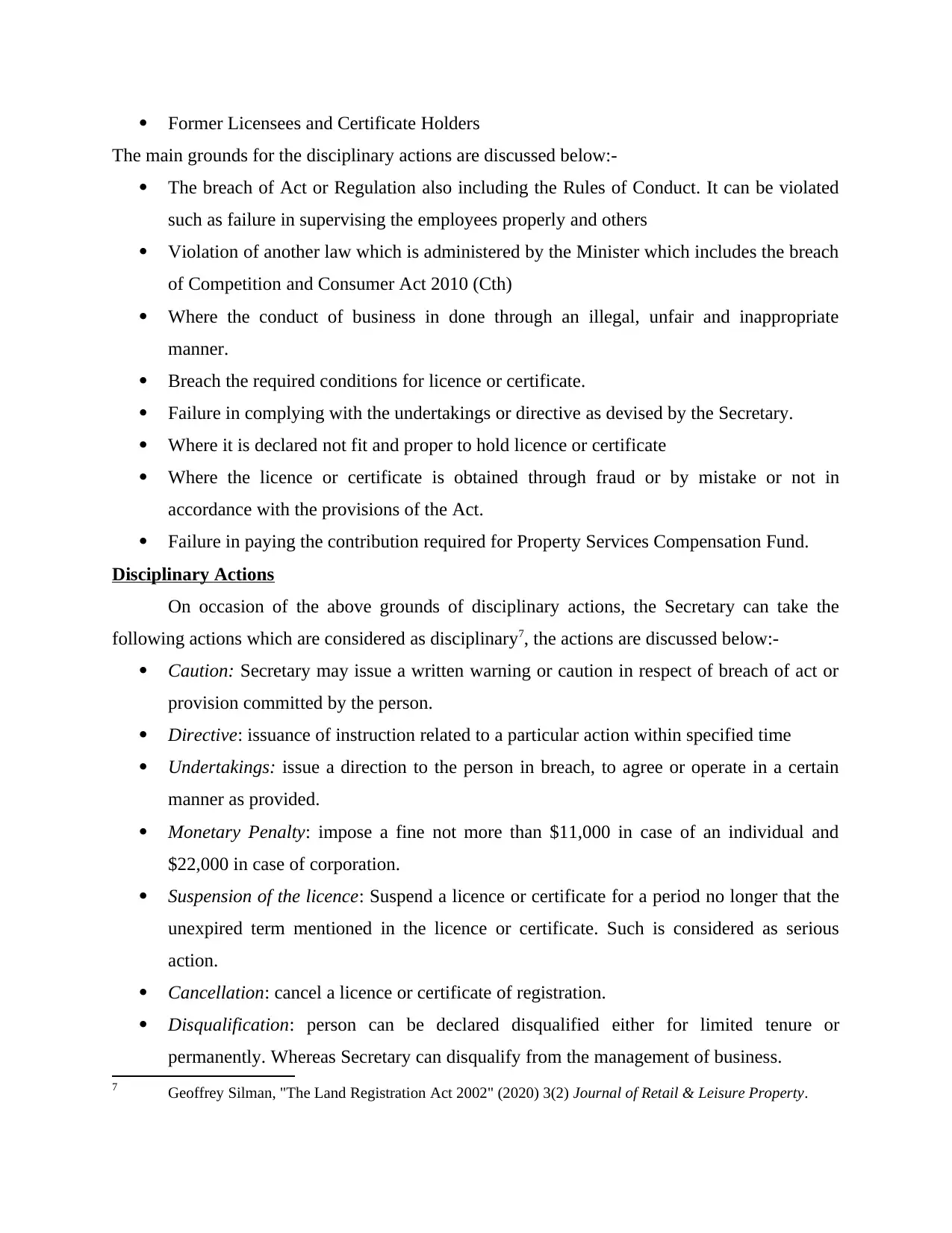
Former Licensees and Certificate Holders
The main grounds for the disciplinary actions are discussed below:-
The breach of Act or Regulation also including the Rules of Conduct. It can be violated
such as failure in supervising the employees properly and others
Violation of another law which is administered by the Minister which includes the breach
of Competition and Consumer Act 2010 (Cth)
Where the conduct of business in done through an illegal, unfair and inappropriate
manner.
Breach the required conditions for licence or certificate.
Failure in complying with the undertakings or directive as devised by the Secretary.
Where it is declared not fit and proper to hold licence or certificate
Where the licence or certificate is obtained through fraud or by mistake or not in
accordance with the provisions of the Act.
Failure in paying the contribution required for Property Services Compensation Fund.
Disciplinary Actions
On occasion of the above grounds of disciplinary actions, the Secretary can take the
following actions which are considered as disciplinary7, the actions are discussed below:-
Caution: Secretary may issue a written warning or caution in respect of breach of act or
provision committed by the person.
Directive: issuance of instruction related to a particular action within specified time
Undertakings: issue a direction to the person in breach, to agree or operate in a certain
manner as provided.
Monetary Penalty: impose a fine not more than $11,000 in case of an individual and
$22,000 in case of corporation.
Suspension of the licence: Suspend a licence or certificate for a period no longer that the
unexpired term mentioned in the licence or certificate. Such is considered as serious
action.
Cancellation: cancel a licence or certificate of registration.
Disqualification: person can be declared disqualified either for limited tenure or
permanently. Whereas Secretary can disqualify from the management of business.
7 Geoffrey Silman, "The Land Registration Act 2002" (2020) 3(2) Journal of Retail & Leisure Property.
The main grounds for the disciplinary actions are discussed below:-
The breach of Act or Regulation also including the Rules of Conduct. It can be violated
such as failure in supervising the employees properly and others
Violation of another law which is administered by the Minister which includes the breach
of Competition and Consumer Act 2010 (Cth)
Where the conduct of business in done through an illegal, unfair and inappropriate
manner.
Breach the required conditions for licence or certificate.
Failure in complying with the undertakings or directive as devised by the Secretary.
Where it is declared not fit and proper to hold licence or certificate
Where the licence or certificate is obtained through fraud or by mistake or not in
accordance with the provisions of the Act.
Failure in paying the contribution required for Property Services Compensation Fund.
Disciplinary Actions
On occasion of the above grounds of disciplinary actions, the Secretary can take the
following actions which are considered as disciplinary7, the actions are discussed below:-
Caution: Secretary may issue a written warning or caution in respect of breach of act or
provision committed by the person.
Directive: issuance of instruction related to a particular action within specified time
Undertakings: issue a direction to the person in breach, to agree or operate in a certain
manner as provided.
Monetary Penalty: impose a fine not more than $11,000 in case of an individual and
$22,000 in case of corporation.
Suspension of the licence: Suspend a licence or certificate for a period no longer that the
unexpired term mentioned in the licence or certificate. Such is considered as serious
action.
Cancellation: cancel a licence or certificate of registration.
Disqualification: person can be declared disqualified either for limited tenure or
permanently. Whereas Secretary can disqualify from the management of business.
7 Geoffrey Silman, "The Land Registration Act 2002" (2020) 3(2) Journal of Retail & Leisure Property.
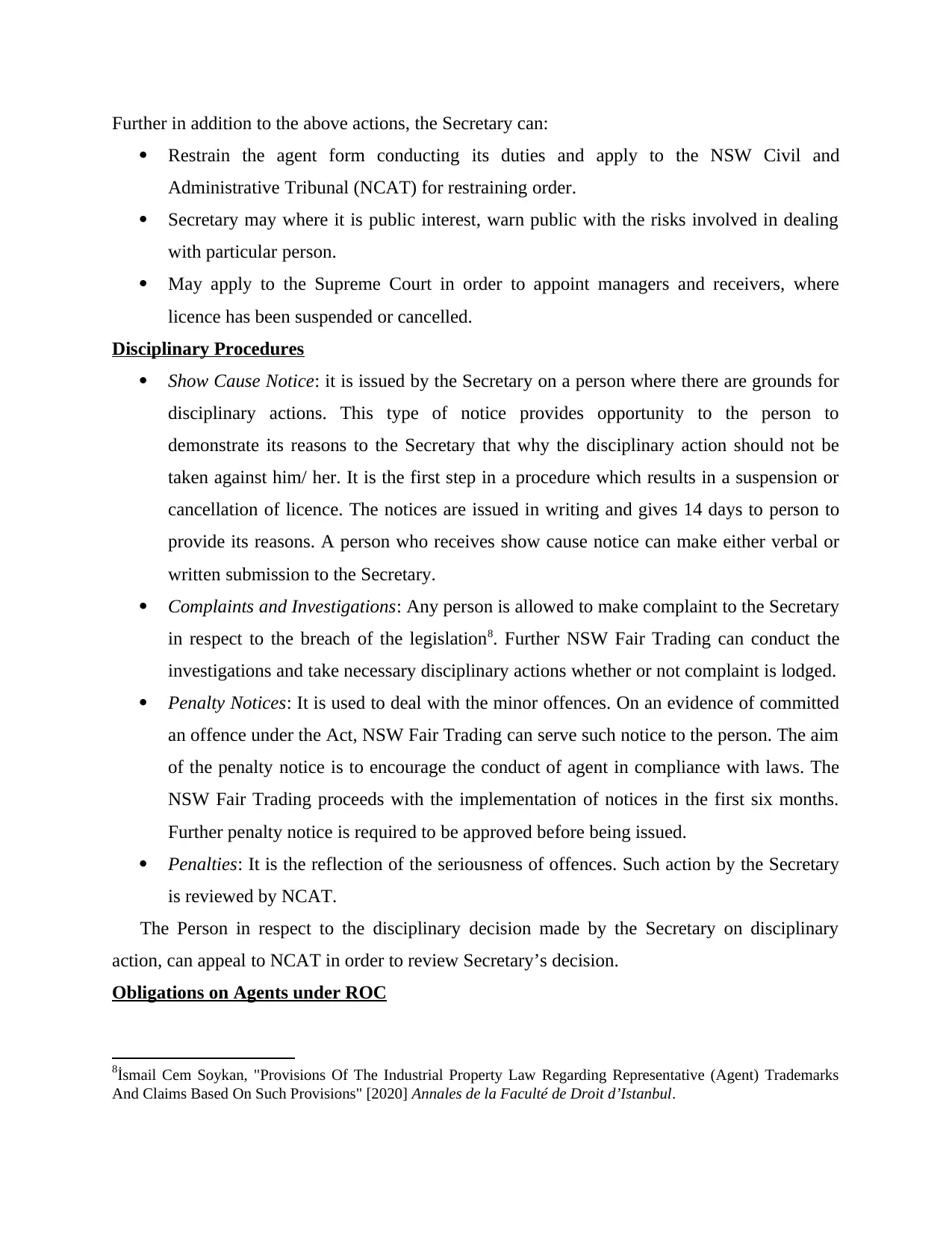
Further in addition to the above actions, the Secretary can:
Restrain the agent form conducting its duties and apply to the NSW Civil and
Administrative Tribunal (NCAT) for restraining order.
Secretary may where it is public interest, warn public with the risks involved in dealing
with particular person.
May apply to the Supreme Court in order to appoint managers and receivers, where
licence has been suspended or cancelled.
Disciplinary Procedures
Show Cause Notice: it is issued by the Secretary on a person where there are grounds for
disciplinary actions. This type of notice provides opportunity to the person to
demonstrate its reasons to the Secretary that why the disciplinary action should not be
taken against him/ her. It is the first step in a procedure which results in a suspension or
cancellation of licence. The notices are issued in writing and gives 14 days to person to
provide its reasons. A person who receives show cause notice can make either verbal or
written submission to the Secretary.
Complaints and Investigations: Any person is allowed to make complaint to the Secretary
in respect to the breach of the legislation8. Further NSW Fair Trading can conduct the
investigations and take necessary disciplinary actions whether or not complaint is lodged.
Penalty Notices: It is used to deal with the minor offences. On an evidence of committed
an offence under the Act, NSW Fair Trading can serve such notice to the person. The aim
of the penalty notice is to encourage the conduct of agent in compliance with laws. The
NSW Fair Trading proceeds with the implementation of notices in the first six months.
Further penalty notice is required to be approved before being issued.
Penalties: It is the reflection of the seriousness of offences. Such action by the Secretary
is reviewed by NCAT.
The Person in respect to the disciplinary decision made by the Secretary on disciplinary
action, can appeal to NCAT in order to review Secretary’s decision.
Obligations on Agents under ROC
8İsmail Cem Soykan, "Provisions Of The Industrial Property Law Regarding Representative (Agent) Trademarks
And Claims Based On Such Provisions" [2020] Annales de la Faculté de Droit d’Istanbul.
Restrain the agent form conducting its duties and apply to the NSW Civil and
Administrative Tribunal (NCAT) for restraining order.
Secretary may where it is public interest, warn public with the risks involved in dealing
with particular person.
May apply to the Supreme Court in order to appoint managers and receivers, where
licence has been suspended or cancelled.
Disciplinary Procedures
Show Cause Notice: it is issued by the Secretary on a person where there are grounds for
disciplinary actions. This type of notice provides opportunity to the person to
demonstrate its reasons to the Secretary that why the disciplinary action should not be
taken against him/ her. It is the first step in a procedure which results in a suspension or
cancellation of licence. The notices are issued in writing and gives 14 days to person to
provide its reasons. A person who receives show cause notice can make either verbal or
written submission to the Secretary.
Complaints and Investigations: Any person is allowed to make complaint to the Secretary
in respect to the breach of the legislation8. Further NSW Fair Trading can conduct the
investigations and take necessary disciplinary actions whether or not complaint is lodged.
Penalty Notices: It is used to deal with the minor offences. On an evidence of committed
an offence under the Act, NSW Fair Trading can serve such notice to the person. The aim
of the penalty notice is to encourage the conduct of agent in compliance with laws. The
NSW Fair Trading proceeds with the implementation of notices in the first six months.
Further penalty notice is required to be approved before being issued.
Penalties: It is the reflection of the seriousness of offences. Such action by the Secretary
is reviewed by NCAT.
The Person in respect to the disciplinary decision made by the Secretary on disciplinary
action, can appeal to NCAT in order to review Secretary’s decision.
Obligations on Agents under ROC
8İsmail Cem Soykan, "Provisions Of The Industrial Property Law Regarding Representative (Agent) Trademarks
And Claims Based On Such Provisions" [2020] Annales de la Faculté de Droit d’Istanbul.
⊘ This is a preview!⊘
Do you want full access?
Subscribe today to unlock all pages.

Trusted by 1+ million students worldwide
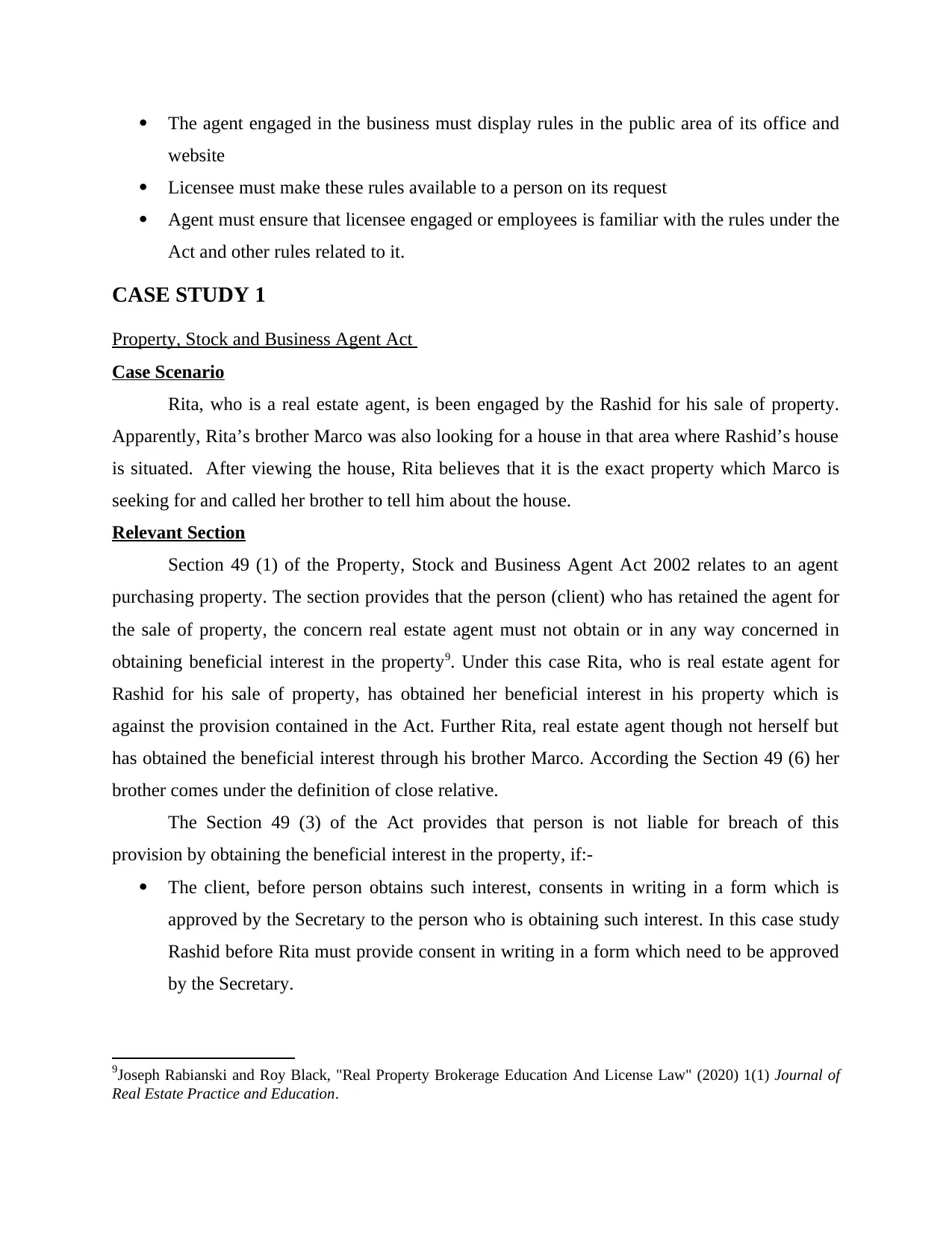
The agent engaged in the business must display rules in the public area of its office and
website
Licensee must make these rules available to a person on its request
Agent must ensure that licensee engaged or employees is familiar with the rules under the
Act and other rules related to it.
CASE STUDY 1
Property, Stock and Business Agent Act
Case Scenario
Rita, who is a real estate agent, is been engaged by the Rashid for his sale of property.
Apparently, Rita’s brother Marco was also looking for a house in that area where Rashid’s house
is situated. After viewing the house, Rita believes that it is the exact property which Marco is
seeking for and called her brother to tell him about the house.
Relevant Section
Section 49 (1) of the Property, Stock and Business Agent Act 2002 relates to an agent
purchasing property. The section provides that the person (client) who has retained the agent for
the sale of property, the concern real estate agent must not obtain or in any way concerned in
obtaining beneficial interest in the property9. Under this case Rita, who is real estate agent for
Rashid for his sale of property, has obtained her beneficial interest in his property which is
against the provision contained in the Act. Further Rita, real estate agent though not herself but
has obtained the beneficial interest through his brother Marco. According the Section 49 (6) her
brother comes under the definition of close relative.
The Section 49 (3) of the Act provides that person is not liable for breach of this
provision by obtaining the beneficial interest in the property, if:-
The client, before person obtains such interest, consents in writing in a form which is
approved by the Secretary to the person who is obtaining such interest. In this case study
Rashid before Rita must provide consent in writing in a form which need to be approved
by the Secretary.
9Joseph Rabianski and Roy Black, "Real Property Brokerage Education And License Law" (2020) 1(1) Journal of
Real Estate Practice and Education.
website
Licensee must make these rules available to a person on its request
Agent must ensure that licensee engaged or employees is familiar with the rules under the
Act and other rules related to it.
CASE STUDY 1
Property, Stock and Business Agent Act
Case Scenario
Rita, who is a real estate agent, is been engaged by the Rashid for his sale of property.
Apparently, Rita’s brother Marco was also looking for a house in that area where Rashid’s house
is situated. After viewing the house, Rita believes that it is the exact property which Marco is
seeking for and called her brother to tell him about the house.
Relevant Section
Section 49 (1) of the Property, Stock and Business Agent Act 2002 relates to an agent
purchasing property. The section provides that the person (client) who has retained the agent for
the sale of property, the concern real estate agent must not obtain or in any way concerned in
obtaining beneficial interest in the property9. Under this case Rita, who is real estate agent for
Rashid for his sale of property, has obtained her beneficial interest in his property which is
against the provision contained in the Act. Further Rita, real estate agent though not herself but
has obtained the beneficial interest through his brother Marco. According the Section 49 (6) her
brother comes under the definition of close relative.
The Section 49 (3) of the Act provides that person is not liable for breach of this
provision by obtaining the beneficial interest in the property, if:-
The client, before person obtains such interest, consents in writing in a form which is
approved by the Secretary to the person who is obtaining such interest. In this case study
Rashid before Rita must provide consent in writing in a form which need to be approved
by the Secretary.
9Joseph Rabianski and Roy Black, "Real Property Brokerage Education And License Law" (2020) 1(1) Journal of
Real Estate Practice and Education.
Paraphrase This Document
Need a fresh take? Get an instant paraphrase of this document with our AI Paraphraser
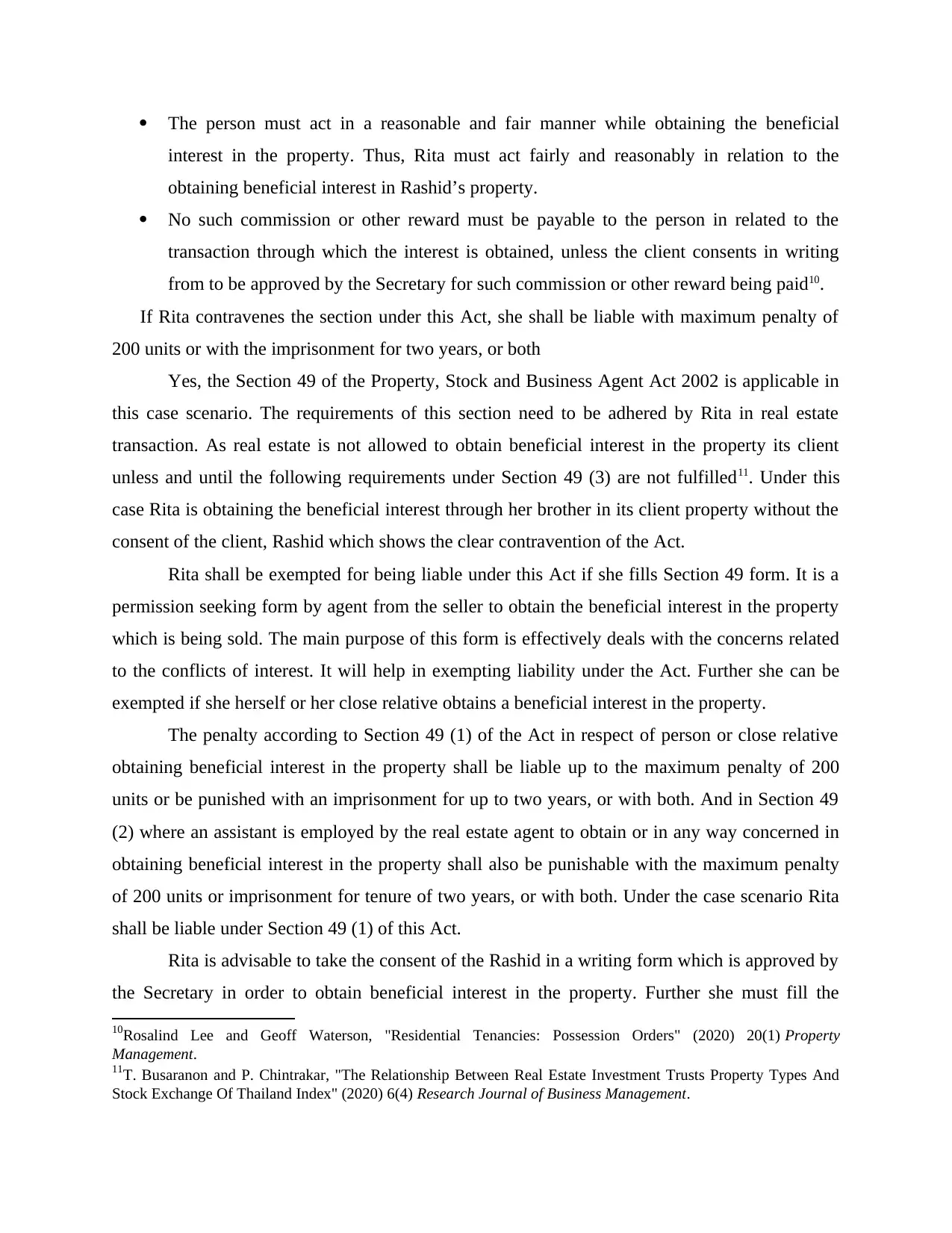
The person must act in a reasonable and fair manner while obtaining the beneficial
interest in the property. Thus, Rita must act fairly and reasonably in relation to the
obtaining beneficial interest in Rashid’s property.
No such commission or other reward must be payable to the person in related to the
transaction through which the interest is obtained, unless the client consents in writing
from to be approved by the Secretary for such commission or other reward being paid10.
If Rita contravenes the section under this Act, she shall be liable with maximum penalty of
200 units or with the imprisonment for two years, or both
Yes, the Section 49 of the Property, Stock and Business Agent Act 2002 is applicable in
this case scenario. The requirements of this section need to be adhered by Rita in real estate
transaction. As real estate is not allowed to obtain beneficial interest in the property its client
unless and until the following requirements under Section 49 (3) are not fulfilled11. Under this
case Rita is obtaining the beneficial interest through her brother in its client property without the
consent of the client, Rashid which shows the clear contravention of the Act.
Rita shall be exempted for being liable under this Act if she fills Section 49 form. It is a
permission seeking form by agent from the seller to obtain the beneficial interest in the property
which is being sold. The main purpose of this form is effectively deals with the concerns related
to the conflicts of interest. It will help in exempting liability under the Act. Further she can be
exempted if she herself or her close relative obtains a beneficial interest in the property.
The penalty according to Section 49 (1) of the Act in respect of person or close relative
obtaining beneficial interest in the property shall be liable up to the maximum penalty of 200
units or be punished with an imprisonment for up to two years, or with both. And in Section 49
(2) where an assistant is employed by the real estate agent to obtain or in any way concerned in
obtaining beneficial interest in the property shall also be punishable with the maximum penalty
of 200 units or imprisonment for tenure of two years, or with both. Under the case scenario Rita
shall be liable under Section 49 (1) of this Act.
Rita is advisable to take the consent of the Rashid in a writing form which is approved by
the Secretary in order to obtain beneficial interest in the property. Further she must fill the
10Rosalind Lee and Geoff Waterson, "Residential Tenancies: Possession Orders" (2020) 20(1) Property
Management.
11T. Busaranon and P. Chintrakar, "The Relationship Between Real Estate Investment Trusts Property Types And
Stock Exchange Of Thailand Index" (2020) 6(4) Research Journal of Business Management.
interest in the property. Thus, Rita must act fairly and reasonably in relation to the
obtaining beneficial interest in Rashid’s property.
No such commission or other reward must be payable to the person in related to the
transaction through which the interest is obtained, unless the client consents in writing
from to be approved by the Secretary for such commission or other reward being paid10.
If Rita contravenes the section under this Act, she shall be liable with maximum penalty of
200 units or with the imprisonment for two years, or both
Yes, the Section 49 of the Property, Stock and Business Agent Act 2002 is applicable in
this case scenario. The requirements of this section need to be adhered by Rita in real estate
transaction. As real estate is not allowed to obtain beneficial interest in the property its client
unless and until the following requirements under Section 49 (3) are not fulfilled11. Under this
case Rita is obtaining the beneficial interest through her brother in its client property without the
consent of the client, Rashid which shows the clear contravention of the Act.
Rita shall be exempted for being liable under this Act if she fills Section 49 form. It is a
permission seeking form by agent from the seller to obtain the beneficial interest in the property
which is being sold. The main purpose of this form is effectively deals with the concerns related
to the conflicts of interest. It will help in exempting liability under the Act. Further she can be
exempted if she herself or her close relative obtains a beneficial interest in the property.
The penalty according to Section 49 (1) of the Act in respect of person or close relative
obtaining beneficial interest in the property shall be liable up to the maximum penalty of 200
units or be punished with an imprisonment for up to two years, or with both. And in Section 49
(2) where an assistant is employed by the real estate agent to obtain or in any way concerned in
obtaining beneficial interest in the property shall also be punishable with the maximum penalty
of 200 units or imprisonment for tenure of two years, or with both. Under the case scenario Rita
shall be liable under Section 49 (1) of this Act.
Rita is advisable to take the consent of the Rashid in a writing form which is approved by
the Secretary in order to obtain beneficial interest in the property. Further she must fill the
10Rosalind Lee and Geoff Waterson, "Residential Tenancies: Possession Orders" (2020) 20(1) Property
Management.
11T. Busaranon and P. Chintrakar, "The Relationship Between Real Estate Investment Trusts Property Types And
Stock Exchange Of Thailand Index" (2020) 6(4) Research Journal of Business Management.
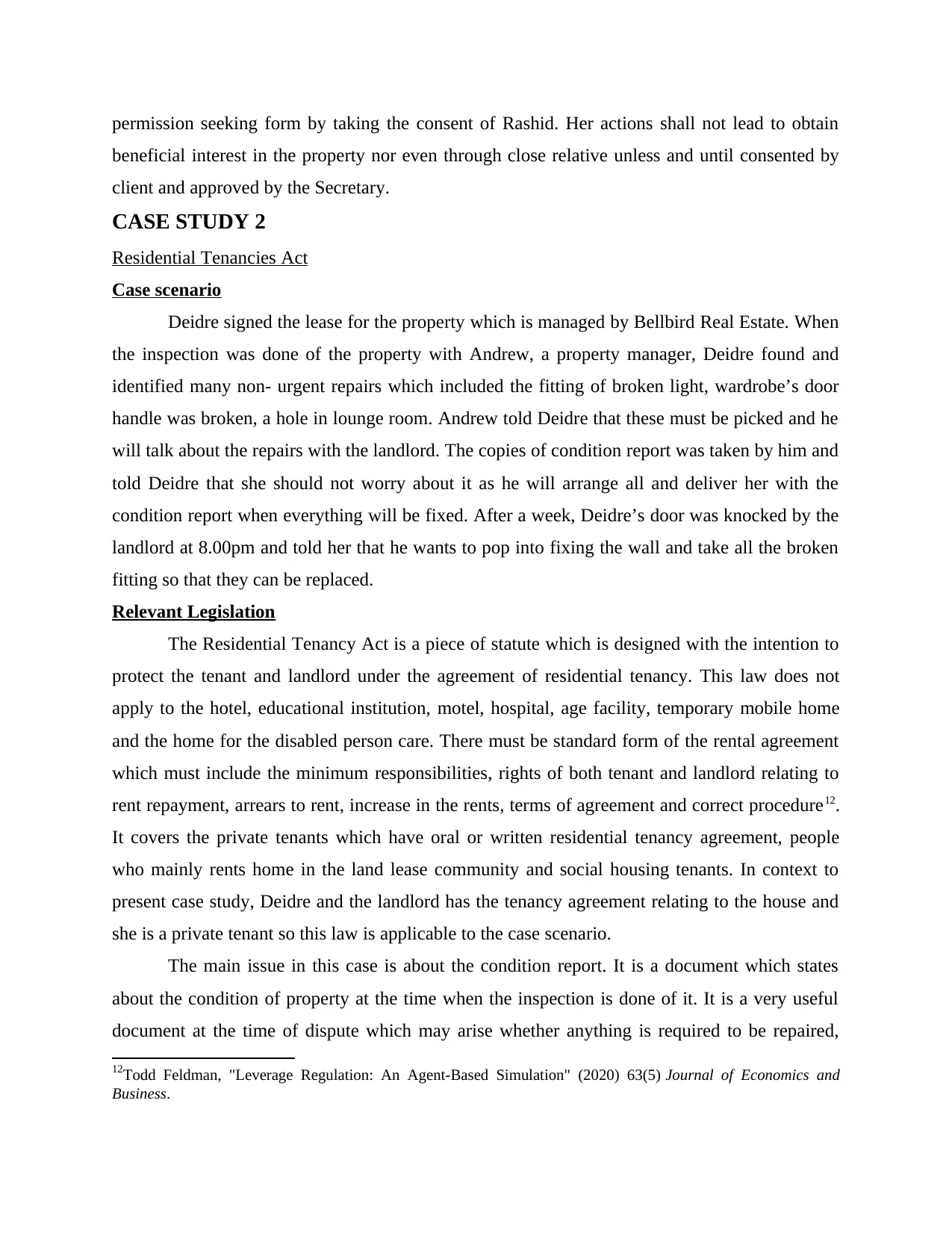
permission seeking form by taking the consent of Rashid. Her actions shall not lead to obtain
beneficial interest in the property nor even through close relative unless and until consented by
client and approved by the Secretary.
CASE STUDY 2
Residential Tenancies Act
Case scenario
Deidre signed the lease for the property which is managed by Bellbird Real Estate. When
the inspection was done of the property with Andrew, a property manager, Deidre found and
identified many non- urgent repairs which included the fitting of broken light, wardrobe’s door
handle was broken, a hole in lounge room. Andrew told Deidre that these must be picked and he
will talk about the repairs with the landlord. The copies of condition report was taken by him and
told Deidre that she should not worry about it as he will arrange all and deliver her with the
condition report when everything will be fixed. After a week, Deidre’s door was knocked by the
landlord at 8.00pm and told her that he wants to pop into fixing the wall and take all the broken
fitting so that they can be replaced.
Relevant Legislation
The Residential Tenancy Act is a piece of statute which is designed with the intention to
protect the tenant and landlord under the agreement of residential tenancy. This law does not
apply to the hotel, educational institution, motel, hospital, age facility, temporary mobile home
and the home for the disabled person care. There must be standard form of the rental agreement
which must include the minimum responsibilities, rights of both tenant and landlord relating to
rent repayment, arrears to rent, increase in the rents, terms of agreement and correct procedure12.
It covers the private tenants which have oral or written residential tenancy agreement, people
who mainly rents home in the land lease community and social housing tenants. In context to
present case study, Deidre and the landlord has the tenancy agreement relating to the house and
she is a private tenant so this law is applicable to the case scenario.
The main issue in this case is about the condition report. It is a document which states
about the condition of property at the time when the inspection is done of it. It is a very useful
document at the time of dispute which may arise whether anything is required to be repaired,
12Todd Feldman, "Leverage Regulation: An Agent-Based Simulation" (2020) 63(5) Journal of Economics and
Business.
beneficial interest in the property nor even through close relative unless and until consented by
client and approved by the Secretary.
CASE STUDY 2
Residential Tenancies Act
Case scenario
Deidre signed the lease for the property which is managed by Bellbird Real Estate. When
the inspection was done of the property with Andrew, a property manager, Deidre found and
identified many non- urgent repairs which included the fitting of broken light, wardrobe’s door
handle was broken, a hole in lounge room. Andrew told Deidre that these must be picked and he
will talk about the repairs with the landlord. The copies of condition report was taken by him and
told Deidre that she should not worry about it as he will arrange all and deliver her with the
condition report when everything will be fixed. After a week, Deidre’s door was knocked by the
landlord at 8.00pm and told her that he wants to pop into fixing the wall and take all the broken
fitting so that they can be replaced.
Relevant Legislation
The Residential Tenancy Act is a piece of statute which is designed with the intention to
protect the tenant and landlord under the agreement of residential tenancy. This law does not
apply to the hotel, educational institution, motel, hospital, age facility, temporary mobile home
and the home for the disabled person care. There must be standard form of the rental agreement
which must include the minimum responsibilities, rights of both tenant and landlord relating to
rent repayment, arrears to rent, increase in the rents, terms of agreement and correct procedure12.
It covers the private tenants which have oral or written residential tenancy agreement, people
who mainly rents home in the land lease community and social housing tenants. In context to
present case study, Deidre and the landlord has the tenancy agreement relating to the house and
she is a private tenant so this law is applicable to the case scenario.
The main issue in this case is about the condition report. It is a document which states
about the condition of property at the time when the inspection is done of it. It is a very useful
document at the time of dispute which may arise whether anything is required to be repaired,
12Todd Feldman, "Leverage Regulation: An Agent-Based Simulation" (2020) 63(5) Journal of Economics and
Business.
⊘ This is a preview!⊘
Do you want full access?
Subscribe today to unlock all pages.

Trusted by 1+ million students worldwide
1 out of 15
Related Documents
Your All-in-One AI-Powered Toolkit for Academic Success.
+13062052269
info@desklib.com
Available 24*7 on WhatsApp / Email
![[object Object]](/_next/static/media/star-bottom.7253800d.svg)
Unlock your academic potential
Copyright © 2020–2026 A2Z Services. All Rights Reserved. Developed and managed by ZUCOL.





